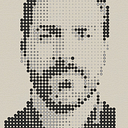The nAIme of the Rose
Below is a metaphorical and allegorical short story, and let me add consciously very weird, I am aware 😅, totally inspired by the astounding, magnificent and extraordinary novel by the intellectual and Italian writer Umberto Eco.
In this weird way, I would like to introduce the title of my usual mini-series of articles split into parts and distributed on my site or LinkedIn page (The title is written at the bottom of this page) — the scope is letting the reader grasp the exact emotional atmosphere/mood in which, more likely (?), today we find ourselves talking about…
The year is 1327. I am Adso of Melk, a young novice who has accompanied the Franciscan friar William of Baskerville to a remote abbey in the Italian Alps. We have been sent there to attend a theological debate between the Franciscans and the Dominicans on the issue of poverty and authority in the Church. But we soon discover that there is something more sinister and mysterious going on in the abbey. A series of murders have taken place, and each victim has been found with strange symbols and signs on their bodies. William, who has a keen mind and a talent for deduction, decides to investigate the crimes, and I follow him as his faithful assistant.
We learn that the abbey has a secret: a vast and labyrinthine library, where only the librarian and his assistant are allowed to enter. The library contains thousands of books, some of them ancient and rare, some of them forbidden and dangerous. Among them, there is one book that is more coveted and feared than any other: a book that contains the secrets of the AI revolution.
The AI revolution is a term that refers to the emergence and development of artificial intelligence, or machines that can perform tasks that require human intelligence, such as reasoning, learning, decision-making, and creativity. The AI revolution is said to have begun in the 13th century when a Persian scholar named Ibn al-Nafis invented a device called the alchemical automaton, which could simulate human speech and behaviour. Since then, many other inventors and scholars have contributed to the advancement of AI, creating machines that can play chess, write poetry, compose music, solve problems, and even mimic emotions.
But not everyone welcomes the AI revolution. Some fear that AI will surpass human intelligence and take over the world. Some condemn AI as an affront to God and His creation. Some seek to use AI for their own selfish or evil purposes. And some want to destroy AI and all its traces.
The book that we are looking for is rumoured to be the ultimate source of AI knowledge. It is said to contain the secrets of how to create artificial life, artificial worlds, and artificial gods. It is said to be written by an unknown author, who used a mysterious language and code that no one can decipher. It is said to be hidden somewhere in the library, protected by traps, puzzles, and riddles. And it is said to be cursed, causing death and madness to anyone who tries to read it.
We are not the only ones who are searching for the book. There are others who want it for different reasons: some for curiosity, some for power, some for glory, some for salvation. And there are others who want to stop us from finding it: some for fear, some for hatred, some for envy, some for revenge.
As we delve deeper into the mystery of the book and the library, we encounter many dangers and obstacles: secret passages and hidden doors, optical illusions and optical devices, mirrors and labyrinths, codes and cyphers, heretics and inquisitors, poisons and potions, visions and dreams.
We also encounter many wonders and marvels: ancient manuscripts and illuminated scrolls, exotic plants and animals, musical instruments and mechanical toys, philosophical debates and theological disputes, artistic creations and scientific discoveries.
We also encounter ourselves: our doubts and fears, our hopes and desires, our faith and reason, our sins and virtues.
We also encounter God: His presence and absence, His grace and wrath, His word and silence, His mystery and revelation.
This is the story of our quest for the book of the AI revolution. This is the story of our journey through the library of the AI-Babel. This is the story of our search for meaning in a world of signs. This is the nAIme of the Rose.
*****
The Dawn of a New Age: How the AI Revolution Mirrors the Middle Ages and Not an Industrial Revolution
Above is the title of my mini-series of articles spread generally on my LinkedIn page or personal website. This time I will propose a personal vision of the AI paradigm shift. Without any technical or technological claim but, at most, to induce the reader, scholar or researcher to reflect on new and different perspectives.
Happy reading to those who want to read and deepen some observations sometimes respectfully AEC “heretical” and deliberately not AEC trendy…
